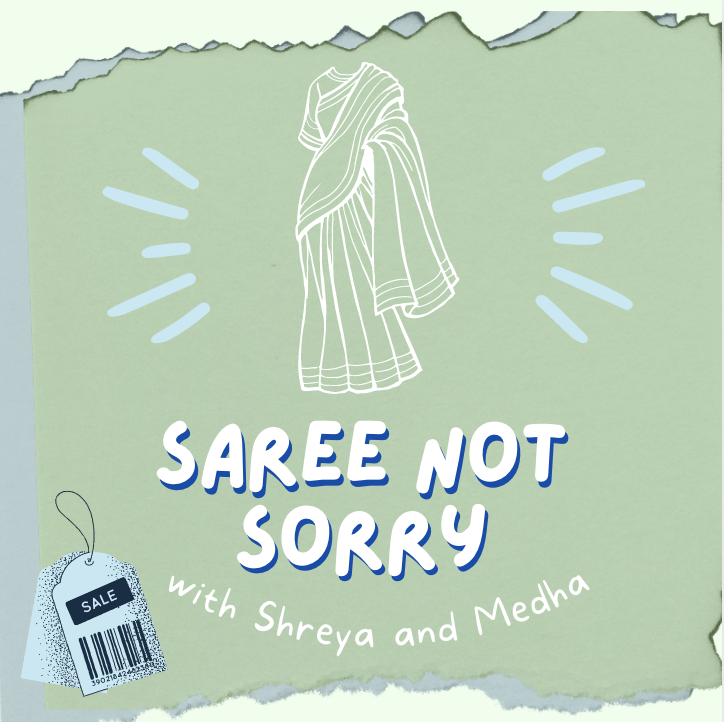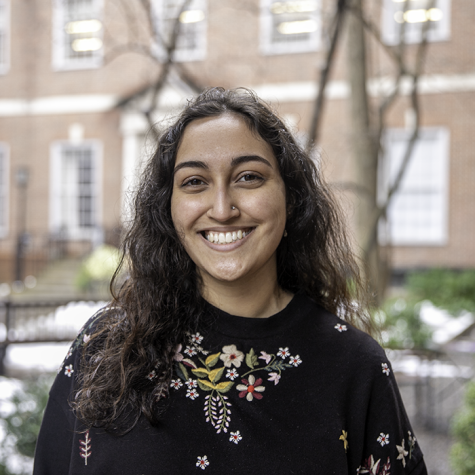‘Saree Not Sorry’ podcast critiques South Asian media representation
First-years Shreya Mathur and Medha Gupta discuss their goals for their new podcast “Saree Not Sorry,” which explores South Asian representation in mainstream media. This is the fifth and final article in Sabrina Choudhary’s series documenting Asian and Pacific Islander students’ experiences with race at NYU.
Shreya Mathur and Medha Gupta’s podcast “Saree Not Sorry” explores South Asian representation in mainstream media. This first-year student’s podcast is available to stream on all platforms and airs on Wednesdays on WNYU, 89.1 FM. (Illustration by Shreya Mathur and Medha Gupta)
May 7, 2021
Shreya Mathur and Medha Gupta, first-years in LS and CAS respectively, have made the most of their first tumultuous year on campus. The pandemic made it challenging for the class of 2024 to connect with their peers, meaning Gupta and Mathur’s friendship is an accomplishment in itself. Yet they created something even bigger than that this year: their podcast, “Saree Not Sorry.”
Gupta is Indian American and grew up in Washington, D.C., and Mathur moved from Mumbai to New Jersey when she was 13. The two met in the fall at a club called the Tamid Group where, as the only South Asians in their program, they gravitated towards each other. Bonding over their shared cultural experiences gave them the idea to collaborate on a project.
“We would just text about Bollywood movies or something, and we would go off in our texts,” Mathur said. “One of us brought up the point, ‘What if we just started a podcast?’”
It began as a joke, but when Gupta learned that NYU’s student-run radio station WNYU was accepting applications for new shows, Mathur agreed. They created “Saree Not Sorry” to delve into issues of South Asian representation in media, from Bollywood to TikTok to the medium of podcasting itself. They hope their discussions will help South Asian listeners feel validated in their struggles.
“I think our primary role is to promote discourse within the South Asian community,” Mathur said. “Also to give people solace in the fact that there are so many other people who are facing the same problems and noticing the same issues in the world around them.”
Learning to create a podcast under COVID restrictions was difficult. Mathur and Gupta had no editing experience and no equipment beyond their phones, laptops and headphones. WNYU provided them with an audio engineer who mixes and checks their episodes for SEC compliance, but they’re recording it from their separate dorm rooms.
“I think our first episode, we had to completely re-record the day of or the day before it came out just because we had so many audio issues,” Gupta recalled. “We aren’t professionals, and we don’t have a studio that we can access until next semester, just because of COVID, so that was a huge learning curve.”
But with four episodes under their belts, Gupta and Mathur seem to have found their footing. The episode topics thus far have been South Asian stereotypes in recent American television, nepotism in Bollywood casting, an interview with TikToker Shreya Joshi and a conversation with the hosts of Gen Z Unfiltered about anti-API violence. The last episode has been Mathur’s favorite so far.
“That was my favorite because that’s a conversation I haven’t been able to have with older people,” she said. “I just think that people, if they listen to this episode, they’re going to feel a comfort in hearing people talk about it.”
While analyzing characters like Kevin G. from “Mean Girls” and Cece from “New Girl” is lighthearted compared to addressing hate crimes, Gupta and Mathur stress that these conversations are still important.
“Growing up, we watch shows, and they kind of influence the type of person that we are,” Mathur explained. “I think a lot of South Asian characters that we’ve seen so far are always just used as comedic relief, and they always find a way to play into the stereotypes.”
In their first episode, they highlighted how Kelly Kapoor was positioned as a cultural ambassador in the Diwali episode of “The Office” and how Karan Brar was given an accent coach to play Ravi in the Disney Channel show “Jessie.” Since Ravi was so young when he came to the United States, realistically he would have lost his Indian accent as Mathur did when she immigrated.
These tropes are powerful in reinforcing the perpetual-foreigner stereotype of Asians in the United States, and they give viewers a limited idea of who South Asians can be. Mathur and Gupta believe that misrepresentation in mainstream media directly affects how South Asians are treated in the United States.
“There’s so many things that we had to go through when we were younger that we thought were completely normal: so many insults, so many microaggressions. And now we’ve come to realize — and we’re still coming to realize — that those things that we’ve had to undergo, they weren’t acceptable and they shouldn’t be acceptable,” Mathur said.
Mathur and Gupta want South Asian characters who aren’t defined by their ethnicity, tokenized or made into a punchline so that future generations don’t feel boxed in by stereotypes.
“Not using their ethnicity as the butt of a joke or having them be a unidimensional character for the sake of diversity,” Gupta said. “Ideally, that’s what I would like to see.”
Working towards this goal, Mathur and Gupta have plenty of plans for future “Saree Not Sorry” episodes. Listeners can expect more humor, political discussions, guests and exploration of forbidden subjects like dating and cursing.
“We just think that if we go out there and we have these conversations and it’s exposed to the public, more people are going to feel comfortable about their skin and just who they are,” Mathur said.
The students hope that their podcast will contribute to empowering South Asian representation.
“Even if we make a small mark on the world, it would still be some sort of push towards diminishing South Asian stereotypes and embracing South Asians’ reality,” Mathur said. “We don’t take our position lightly.”
“Saree Not Sorry” is available to stream on all platforms and airs on Wednesdays on WNYU, 89.1 FM.
Email Sabrina Choudhary at [email protected].

























































































































































